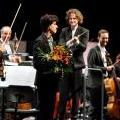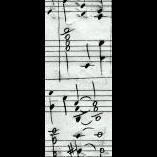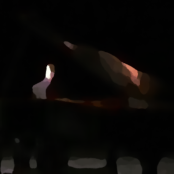Search the Community
Showing results for tags 'choral'.
-
Hey folks, Here is a short choir response which is a part of a larger work I am composing for my church's Easter service. Any comments are appreciated! It is Finished.mp3 It is Finished PDF Score.pdf
-
Hi everyone! I'd like to share a choral piece I'm working on (I think it's mostly in the final stages of composition, perhaps a few notes here and there will be edited, but I think have the form/structure as I would like it.) I set one of my favorite e e cummings poems to music and just felt my way through the text and the emotions I felt while reading. I'd love to hear any critiques from people more experienced with the idiom (I'm studying composition at university, but only started 2 years ago so I am still learning things everyday!) I intend to speak with the choir directors at my university to see if they would be interested in running the piece, and if they have any advice on writing effective choral music. One of the things I am particularly worried about with this piece is the clarity of notation. There are a few parts of this piece where I was unsure of what accidentals to use (such as in the "i fear" section at bar 32) or if I spelled a chord incorrectly, as I predominantly write by ear. If anyone could shine some light on potential problems in this regard, that would be extremely helpful. Thank you in advance for any feedback! i carry your heart with me (i carry it in 12-29-17.mp3 i carry your heart with me (i carry it in 12-29-17.pdf
-
Hello everbody, This is my first serious choral composition, which I composed to practise counterpoint and voice leading. The piece is an Ave Maria, but the language is Dutch, which made it quite hard to compose music on. It is a hard language regarding accentuation. Dutch text: Wees gegroet, Maria, vol van genade. De Heer is met U. Gij zijt de gezegende onder de vrouwen, En gezegend is Jezus, de Vrucht van Uw schoot. Heilige Maria, Moeder van God, Bid voor ons, zondaars, Nu en in het uur van onze dood. Amen. There is trouble with the audio in this topic, so here is the link: Nevertheless, I am pretty content with it. What do you think? Tips are welcome! Maarten
-
A buddy of mine (Gareth Hearne) wrote this microtonal Sanctus in what's called "porcupine temperament", and I finally got around to making a recording of it: Similarly to how western music has a circle of fifths, Porcupine Temperament has a circle of small major seconds (approximately 160 cents wide). It approximates many intervals of the harmonic series as well or better than standard western tuning, especially the 11th harmonic. (Kind of like how barbershop singers sing their minor sevenths or augmented sixths flat to be in tune with the 7th note in the harmonic series, porcupine has a "fourth"-ish thing that lines up with the 11th note in the harmonic series and it, I think, blends very nicely!) If you have any questions on the theory I'd be happy to talk about it, thanks for listening =)
-
Hi all, well I've just wrote this score sheet and I've just used choral, strings and also brass. I wanted to develop that in film score style. So I've just imagining an Empire collapse and what happen after dying an emperor. At result I've just develop this music. I'll be happy if see your comments. Thanks
-
Here's a setting I recently completed of an almost-trite little poem by Bliss Carman (1861-1929). The music is considerably more complex than the words are, but this doesn't bother me--my intent was for the music to reflect the variety and contrasts between the images in the poem, and to underscore its message of strength in diversity. Do you think I succeeded? Recently, I've found I gravitate towards simpler texts for choral music. They seem to allow for a lot more flexibility and interpretation, and music can often add a much-needed extra dimension to them. How do you choose texts when writing vocal music? Also, how do you feel about the balance between choir and piano in the recording? While sample libraries (even word-building ones like Virharmonic) are nowhere near as good as a live performance, they DO allow me to tweak little details to my heart's content. Thanks for listening! SCORE AND AUDIO
-
Ave Regina Caelorum Marian Antiphon for Lent 4 Voices a cappella (SATB) Mode: F Mixolydian Composed: 23-27 May, 2017 Style: 18th Century stile antico closely emulating Late-Renaissance, ca. 1600 Duration: 1 minute, 30 seconds Text: Ave, Regina Caelorum, Ave, Domina Angelorum: Salve, radix, salve, porta Ex qua mundo lux est orta: Gaude, Virgo gloriosa, Super omnes speciosa, Vale, o valde decora, Et pro nobis Christum exora. Translation: Hail, O Queen of Heaven. Hail, O Lady of Angels Hail! thou root, hail! thou gate From whom unto the world, a light has arisen: Rejoice, O glorious Virgin, Lovely beyond all others, Farewell, most beautiful maiden, And pray for us to Christ. Last Sunday, the director of the Schola Cantorum of St. Mary's Cathedral here in Austin, Texas was complaining to me that he was having trouble finding settings of Ave Regina Caelorum that he liked or felt were workable, and he asked me if I had any free time to write a setting for the Schola. I got inspired and by Tuesday began composing this setting, which I just finished last night. I used sixth comma meantone temperament in the recording of the rendering to better emulate the kind of tuning a choral group would probably use in this style and mode, and I used woodwind samples because clarity is lost with the wretched choral samples I have available to me. Being self-taught in this style as in almost everything else, I'm seriously concerned that I have done this according to the rules of 16th Century polyphony, as I understand them. I hope this piece is enjoyable, but by all means, if any of you notice anything in it that I may have done wrong, I'd like to know about it. Thanks!
-
This falls squarely under the category of "what do y'all think of this?" I here present for your consideration the charming villancico "Llegad, moradores de aqueste pensil" by Spanish-born Mexican composer Francisco Martinez de la Costa (1739-1769?). The work was composed for the Solemnity of St. Peter at Oaxaca Cathedral, Mexico, sometime between 1765 and 1769, and is scored for vocal soloists, mixed chorus, trumpet, strings, and continuo (baroque guitar and portative organ, if I remember rightly). The linked recording is of a performance of this work by the Austin Baroque Orchestra and Chorus (I am a member of both) in November, 2015 at historic Mission Concepcion (1731) in San Antonio, Texas. This work has never been published, remaining in manuscript form in the archives of Oaxaca Cathedral, and this performance was probably one of the first anywhere in nearly 200 years, and almost certainly the first in the United States. The performing edition was prepared by ABO's director, Billy Traylor. For those who may not know (most of us), a villancico is a vocal work based on a specific poetical form; it usually consists of a chorus (estribillo) followed by several verses (coplas) and a final repetition of the chorus. Villancicos were extremely popular in Spain and Portugal and their Latin American colonies from the late 15th through 18th Centuries. Some are religious, like this one, but there are many secular villancicos as well. Very little is know of the life of Martinez de la Costa. He was born and trained in Spain, and by 1765 he had become maestro de capilla of Oaxaca Cathedral in the south of Mexico. In 1769 he requested a leave of absence to return to Spain to take care of some of his father's business, and was never heard from again. It is presumed he died while at sea on the voyage home. Now that you know more about villancicos and this unfortunate young Mexican composer than you ever thought you wanted, have a listen to this delightful, quirky little piece. The writing is nothing if not unique and individual. I'll be interested to know what you think. Cheers! https://soundcloud.com/austinbaroqueorchestra/llegad-moradores
-
Hi y'all! I'm writing this for a contest (not hosted by Young Composers). I'm a band guy by nature, but choral music has always struck a special chord (haha) with me. I've spent several months on this piece, and have made some massive progress in the last few weeks. It's at a point where I would feel comfortable submitting it, but the composer's ear is biased. What do you all think works and doesn't work? For example the aleatoric stuff...? (p.s. all I did was record myself whispering nonsense - hopefully it will sound better as a large ensemble doing it!) Thanks!
-
media-a8d40b9f.mp3 I'm senior in high school, and I'm becoming more and more interested in composition. I've taken a couple music theory classes, but beyond that, I have no idea what I'm doing. I wrote this for an English project using the text of a poem from Charlotte Bronte's Jane Eyre. I only had 10 days to work on it, so it's far from perfect. But it's something! Poor Orphan Child (1).mid
-
Hi folks - I was slightly active on this forum from about 2012-2014. Now that I have a little free time, I'm back to share some more music, and it's nice to see so many new members here. Although I've written extensively for all kinds of instrumental ensembles and accompanied voices, I still feel like I'm going by the seat of my pants when writing unaccompanied choir music. This is my 2nd a cappella piece, and there are still some things in it I'm not terribly fond of. In the first half of this piece, I deliberately avoided the lush, homophonic textures that seem to characterize 95% of a cappella choral pieces written today. I tried to create interest in other ways, but I'm not sure it is entirely effective (particularly the transition before letter B... does this break the piece's momentum prematurely? I can't decide). I finally gave in and wrote big, pretty chords in the 2nd half, which I'm actually satisfied with. If anyone has suggestions about making this easier, I'd be happy to hear those as well. Ideally, I'd like this to be singable by intermediate (i.e. decent high school and community) choirs. Thanks for listening! SCORE and AUDIO PS - this mockup is "performed" by Virharmonic Voices of Prague sample library. Word-building choir software is still a long way from sounding realistic, but since I don't have a live recording yet, I figure this is better than MIDI.
- 3 replies
-
- choral
- a cappella
-
(and 1 more)
Tagged with:
-
Hello all, Here is a 2 part treble composition I wrote for Children's Chorus. The text of "When I Hear Music" was inspired by the elementary school chorus that premiered the work. Their thoughts were filled with words of hope, peace and joy. A unison version of the piece was just performed as well. Thank you all for listening! Very proud of these students!
-
This is my first time posting on this site! Just looking for some feedback/suggestions on a few pieces. Unfortunately, all I have is a MIDI file for sound, so I suppose that will have to do. Thanks in advance for any comments! P.S. The midi recording has some strange mistakes in it. Most likely because of not wanting to double up on accidentals when different layers in each part share a note.
- 3 replies
-
- moderate
- a cappella
- (and 5 more)
-
Hey folks, This is my first attempt at composing for choir. It's obviously not a full-scale piece. It's meant for use as a short prelude. I would love some tips on how to spice up the piano part without disrupting the peaceful nature of the piece. Thanks! P.S. I know you all prefer MP3 to MIDI so sorry about that :/ How Lovely is Thy Dwelling Place MIDI.mid
- 3 replies
-
- 1
-

-
- simple
- pianoandvoices
-
(and 5 more)
Tagged with:
-
Hi, I've never composed before but I decided to give it a try this afternoon. This piece is odd I admit, but I love bizarre 20th century music. It was written based on the town I grew up in. I assigned a specific note to each letter of the town/province I grew up in by random selection and then used it as a continuous motif throughout the entire piece in the soprano line. I then based the rest of the composition on specific elements of my town ie. old French folk songs, the train, the prairie winds, change of seasons, nature, and the emptiness of prairie winters. I hope you enjoy it! *Thank you for your comment. I've temporarily taken down the midi file and will re-upload a file that is more accommodating.
- 1 reply
-
- 20thcentury
- newmusic
-
(and 2 more)
Tagged with:
-
Hi, everyone! After hearing some of the beautiful compositions other members of this forum have posted here, I decided to share my first choral piece, a setting of 3 Sara Teasdale poems. I'd love to get some feedback on it and answer any questions people might have.
-
Hi all, I wanted to share this piece with you all! I wrote this for a local competition for a community choir, and it's the first piece I wrote. I ended up showing it to my college choir director and he programmed it for us last year! I'd really like feedback on how to make this more friendly for high school voices, as it's too easy for college choirs and too difficult for high schools with all of the part splits, but I feel like the piece really relies on the open voiced chords in the climax. Any thoughts on that would be greatly appreciated! My parents recorded it with their iPhone, so the video quality isn't the best, but I figured that voices in any sense would be much better than midi. The piece starts about a minute into the video. Thanks for your thoughts! - Pat
-
Hi all, In music class we had to compose a two minute Choral Speaking work for three voices and perform it. The following names of our classmates formed the text of the composition: Alex; Alisha; Cilia; Maarten; Simone. In the last measure ''Meneer Rouschop'' appears. This is our music teacher. . . The Dutch name for this composition is: Driestemmig Namenspreekkoor, which means that there are three voices (soprano, alto and bass) speaking names. Because there is no real pitch, when speaking, but there is a difference between low and high, we decided to write high pitches on the high F, normal pitches on the middle B and low pitches on the low E. Rythm and dynamics are the most important elements in this composition, since there is no real pitch. We tried to develop the three main themes that are introduced in the canon-like section. Feedback would be very nice! Maarten Bauer
-
Gloria Misa en sib.mid
-
This is my first official release... What do you guys think? I'm still not sure if it could be called pop/rock/alternative... a friend sudjested "symphonic pop" but is that really a gerne? Anyway... The show went on! Spread the word and hope you enjoy this https://www.youtube.com/watch?v=NdC0Ila2Dqs
-
Missa in Bb Benedictus.mid Missa in Bb Kyrie.mid Missa in Bb Sanctus.mid
- 2 replies
-
- mass
- classic style
-
(and 1 more)
Tagged with:
-
Opus 9, Madrigal no 1, written for SSATB(lyrics : Bright Star by John Keats). Full album cover and more music available here : https://www.reverbnation.com/mademoisellelilaclucrezia Opus 9.mp3
- 2 replies
-
- poem
- john keats
- (and 10 more)
-
This is a choral composition written for psalm 56.
-
This a composition based on the latin version of the Wessobrunner Gebet.
- 4 replies
-
- choral
- wessobrunner
-
(and 1 more)
Tagged with:
-
A simple choral piece which I was commissioned to write for my school's choral teacher,by whom it was then performed. Unfortunately, I don't have the actual recording, so this is the computerized version. Let me know your thoughts!










